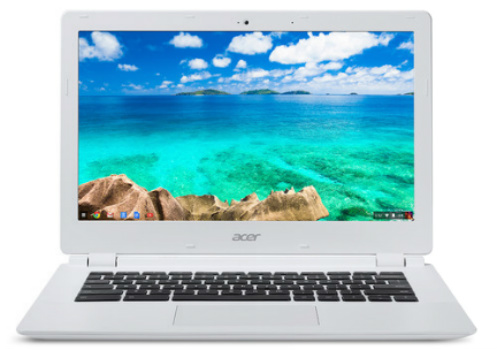Global sales of Google’s Chromebooks will rise 79% this year to reach 5.2 million units and will reach 14.2 million by 2017, Gartner has said. Not bad for a computer platform that still isn’t sold in many countries.
According to the analyst, the engine of this market is the US education sector, which it said accounted for 85% of Chromebook sales in 2013, with most of the platform’s overall popularity still coming from the US.
The top dog within the sector during 2013 was Samsung, which had a 65% share, leaving Acer on 21.4%, HP on 6.8%, Lenovo on 6.7%, and Dell on 0.3%.
These numbers are based on 2013 sales numbers, which were 2.9 million. By the time the 2014 numbers are studied, the market share will probably show more sales for HP and particularly Acer, which has this week announced two Chromebook 13 models featuring with greatly improved battery life and a better display.
However, the eye-catching figure is the 14.2 million sales projection over the next three years, still small next to PCs but from a smaller clutch of countries.
“Competition in the Chromebook market is intensifying as more vendors launch Chromebooks, with eight models in the market in 2014,” said Garner principal analyst, Isabelle Durand.
“Now that the PC market is no longer growing strongly, vendors are searching for new business opportunities. They launched Chromebooks to revive interest in sub-$300 portable PCs once the netbook bubble had burst.”
That’s not entirely true. It could also be argued that the netbook was an early attempt at what the Chromebook now does, saddled with the inefficiency and expense of Windows. Freed from some of these constraints – and featuring superior security – Chromebooks offer a better specification for the money. A growing body of users likes them.
Even today, even expensive ultrabook laptops struggle to offer the battery life of sub-€350 Chromebooks, an indictment of the complacency of the Windows/Intel monopoly.
Gartner remains convinced that Chromebooks will still be a ‘niche’ market in five years’ time although it is possible that by then Windows PCs will be in a similar position if Microsoft doesn’t compete directly by producing some form of Windows cloud computer.
“Making a competitive Chromebook is not just a matter of hardware and price; what is most important is to show how the device’s cloud-based architecture provides genuine advantages to users,” said Durand.
Gartner could be missing the point here. If Google is correct and Chromebooks are taking away Windows sales not because they are glorified netbooks but because they are inherently in step with a cloud-oriented model, Microsoft will at some point be forced to respond with a similar device of its own.
What is changing, then, isn’t the relative positions of two operating sytems but two different models of computing, one old and one new.
Techworld






Subscribers 0
Fans 0
Followers 0
Followers